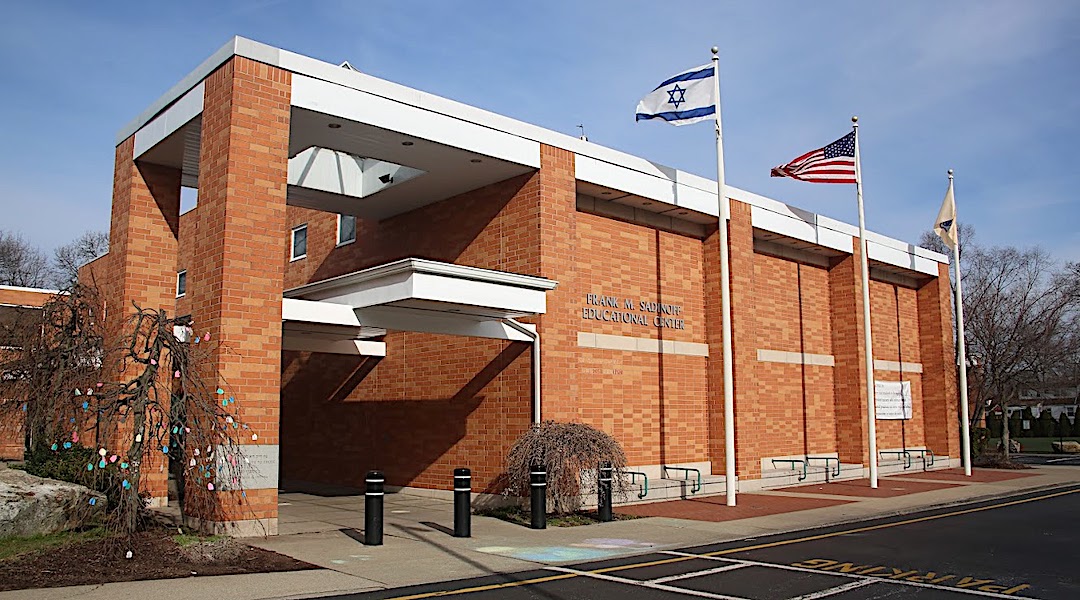US Jewish day schools are enrolling Israeli children who have been displaced by war
“Our parents are tripping over each other to try to make these families feel welcome,” one school leader said

A child waves an Israeli flag during a rally outside of the Israeli embassy on Oct. 8, 2023 in Washington, DC. Photo by Getty Images
(JTA) — More than a month after the start of the school year, Jewish day schools across the United States are experiencing a surge of new students: Israeli children whose own schools have been shuttered by war.
Within days after Hamas’ attack on Israel Oct. 7, Prizmah, the North American network for Jewish day schools, began getting calls from school leaders about accepting Israeli students amid the war.
So far, 50 schools have sent inquiries, according to CEO Paul Bernstein, trying to figure out everything from how to incorporate students who are not fluent in English to how to cover the unexpected expenses of new families who hadn’t planned on paying for school.
“It’s really not a trivial question to take in a student during the year,” Bernstein told the Jewish Telegraphic Agency.
And yet many of those schools have Israeli children newly on their rosters, with others joining them this week — a testament, Bernstein said, to the drive that Jewish day schools have to support Israel and Israelis.
“We think it’s an important contribution that a school can make to its community,” he said. “Of course, none of us wants Israelis to be disconnected from home and not able to be in Israel, but where they are here and with us, every school wants to do as much as possible to support them.”
Israeli schools were at the tail end of a Sukkot holiday break when Hamas attacked, sending the country into crisis and eliciting the largest-ever call-up of Israeli soldiers. Schools remained closed for more than a week before a scattershot reopening began, with some schools holding classes on Zoom and others, in relatively safe zones and with adequate bomb shelters, holding frequently interrupted classes in person. Two weeks after the attack, just 40% of the schools that are permitted to operate in person are doing so.
Given the uncertainty, some families that were visiting the United States during the holiday break have opted to stay. And others have chosen to join them, relocating temporarily from Israel for the relative safety and stability of the United States.
In northern New Jersey, 14 students from Israel had enrolled by the end of last week at Solomon Schechter Day School of Bergen County. Another nine were in discussions about enrolling, according to Steve Freedman, the head of school, who said most of those who have enrolled so far have strong English proficiency and family connections in the area.

An Israeli flag flies outside the Solomon Schechter Day School of Bergen County in New Milford, New Jersey, March 30, 2022. (Courtesy SSDS Communication)
Since the onset of the Israel-Hamas war, four families at the school have already mourned relatives killed in Israel.
“It’s not like our children don’t know that there’s a war going on or a conflict, however it’s described to them by their parents, in Israel,” Freedman said. “So they know that there are families who are staying here right now during the war. And so they know that they’re welcoming children who left their home and they’re very excited to welcome them and be their friend and it’s actually very sweet.”
Homework is optional for the new Israeli students. As they adjust to their new school, expectations will change, but for now, teachers are “feeling out what they’re up to doing,” Freedman explained. For older students, who use MacBooks in the classroom, more laptops are being ordered.
“Our community is completely overwhelmed by what we’re doing in the most positive way,” Freedman said. “There’s a real sense of pride that our community is doing it.”
New students have also enrolled in schools in New York, Maryland, California and elsewhere in New Jersey. In most cases, the schools are not necessarily counting on any tuition payments.
“The mitzvah on our end is just taking them all in and the money’s not the issue,” said Freedman, whose school is taking the rare step of charging monthly tuition for the Israeli families, in acknowledgment of their desire to go home, and waiving payments for families for whom that is an impediment.
“They’re not receiving handouts. This is like a dignity thing,” he said. “And so we’re just feeling each family out so that they’re comfortable and can do what they can do without feeling badly in any way.”
The Rodeph Sholom School in Manhattan is taking the same approach, according to Danny Karpf, the head of school.
“We’re just saying, ‘Come,’” he said. “What we’re going to start doing is saying people can pay what they feel comfortable paying on a monthly basis, as they’re here.”
Across the board, the usual admissions process has been pared down to the basics.
“Let’s make sure we have a phone number, we know who the parent is, we can reach them in an emergency, we need to know if they have allergies,” Karpf said, rolling off the barebones requirements. “We need to know how old they are, so we know what class to put them in, and let’s figure it out.”
Many of the dozen or so new students at Rodeph Sholom do not speak English. But the school is already built for that, Karpf explained, with a program for kids who don’t speak English fluently, and a Hebrew program for Hebrew speakers.
The next steps, he said, are figuring out how to fit as many students as possible in the school, and then raising money to meet their needs. (An Israeli initiative to support Jewish day schools has distributed resources to support teaching about the war but not yet any funding.)
“We have so many families in our community who are directly affected in many ways,” Karpf said. “It’s a way for our children who were already here, whether they’re Israeli or not, to feel more proximate to the conflict in a meaningful way, where children can connect with children and know that they are actually making a difference in comforting and supporting and befriending children who are directly impacted by their family and friends being attacked.”
On Monday, the Joseph Kushner Hebrew Academy & Rae Kushner Yeshiva High School, an Orthodox school in New Jersey, announced that it had already taken in 11 students from five families and expected more to come.
“We are grateful to our JKHA faculty who are seamlessly transitioning students to their classrooms, working together with families to ensure their children acclimate and have a smooth transition to our school and to our students during this trying time,” the school wrote on Facebook.
In Maryland, a pair of Israeli siblings began classes Wednesday at Charles E. Smith Jewish Day School, a pluralistic school that already has resources in place to support Israeli students. (The school serves many families of Israeli diplomats assigned to Washington, D.C.). Three more students are set to start classes this week, including another pair of siblings, and inquiries have come to the elementary, middle and high school divisions.
The school — which is mourning a recent graduate killed Friday while serving in the Israeli army — has guidance counselors in place as well as a program for students who are not yet fluent in English. By the end of the week, the new students already had invitations for weekend activities, said Dorie Ravick, director of admissions at the lower school.
“I spoke to one of our current families who is having one of the new students over on Sunday. So they’re really doing their best to welcome everyone,” she said.
Ravick said not all of the children fully understood the reason for their new classmates.
“They don’t necessarily know why they’re coming because they’re still pretty little,” she said. “The younger ones are just excited to have a new friend.”
The welcoming committees have been out in full force at other schools, too, as local Jewish families look for ways to make a difference at a time of crisis.
“Our parents are tripping over each other to try to make these families feel welcome to the point that we have to say, ‘Give them some time. They need some time to acclimate,’” said Freedman, of Solomon Schechter Day School in New Jersey. “In really bad times, you’re seeing some of the best of who we are.”
This article originally appeared on JTA.org.















